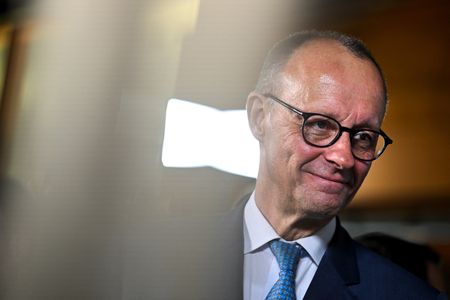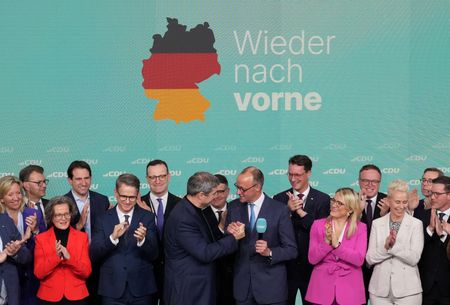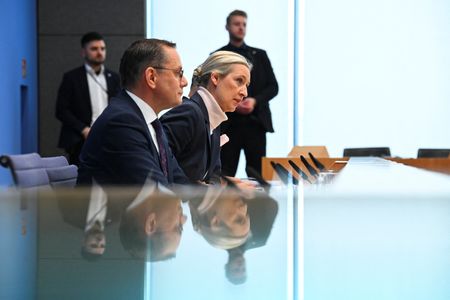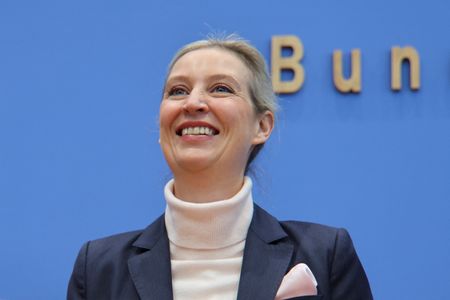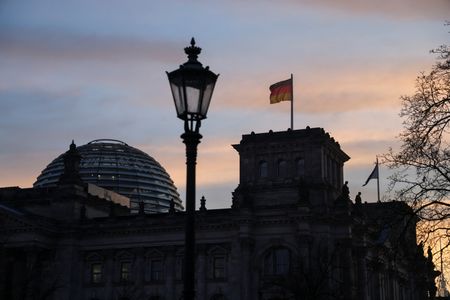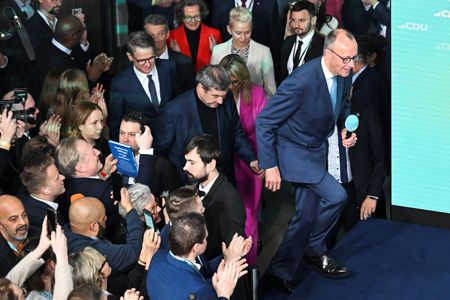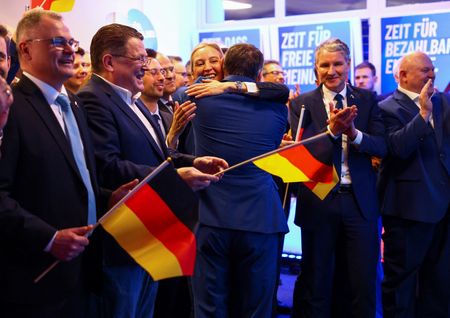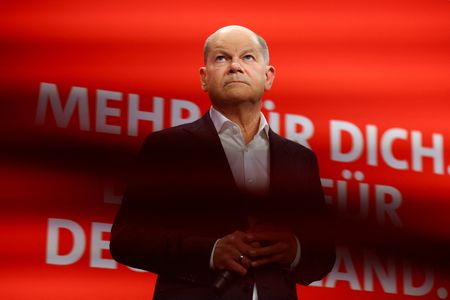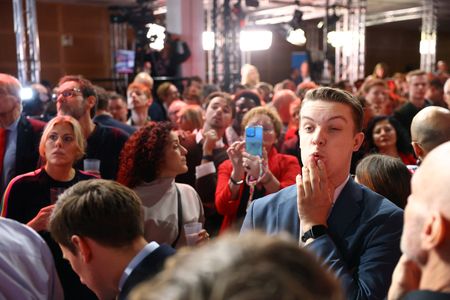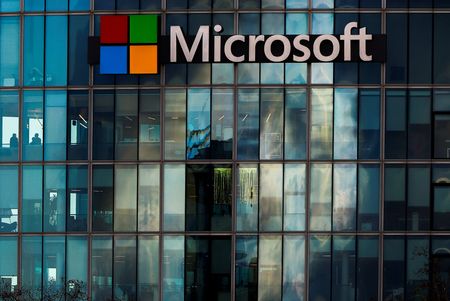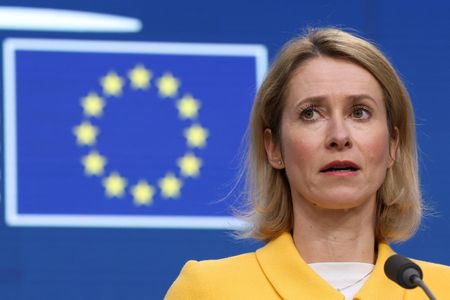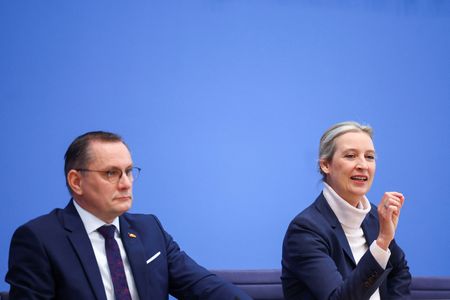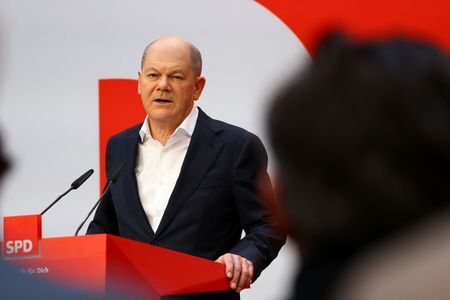By Kirsti Knolle and Madeline Chambers
BERLIN (Reuters) -German conservatives under Friedrich Merz vowed on Monday to quickly form a government after winning a national election but face tricky coalition talks and the prospect of an obstructive parliament after far-right and far-left parties surged.
Time is pressing for Europe’s ailing largest economy, with Germans divided over migration, its security caught between a confrontational U.S. and an assertive Russia and China, and businesses demanding help to remain globally competitive.
The most likely outcome of the election is a coalition of Merz’s conservative bloc and Olaf Scholz’s Social Democrats (SPD), who came in third, after the far-right Alternative for Germany (AfD) surged to a historic second place.
The AfD and the radical Left Party jointly secured one third of seats in the new parliament, enough to block constitutional changes needed to loosen state borrowing limits – changes that some economists say are essential to revive economic growth.
Likely chancellor Merz is expected to seek an alliance with the SPD after a bruising campaign that highlighted deep policy divisions, in particular over migration. The SPD, smarting from its worst post-war result, may set a high price for any deal.
Merz has signaled some willingness to reform the debt brake, a constitutionally enshrined limit on state borrowing.
“The first talks should certainly be held this week, in the next few days. We see the situation in the world, Ukraine, Russia, the United States,” said Jens Spahn, a senior member of Merz’s centre-right Christian Democrats (CDU). “German leadership is needed.”
Merz, who has no previous experience in office, aims to have a government by Easter.
Sunday’s snap election followed the collapse of Scholz’s three-way alliance with the Greens and pro-business Free Democrats (FDP).
‘INDEPENDENCE FROM U.S.’
In an early indication of his policy intentions, Merz took aim at the U.S. after his win, criticising on Sunday what he called “outrageous” comments from Washington during the campaign, comparing them to hostile interventions from Russia.
“For me, the absolute priority will be to strengthen Europe as quickly as possible so that we can achieve real independence from the U.S. step by step,” Merz said on Sunday.
In another bold move, Merz invited Benjamin Netanyahu to visit Germany in defiance of an arrest warrant for the Israeli prime minister issued by the International Criminal Court over alleged war crimes in Gaza, Netanyahu’s office said.
Merz’s conservative CDU/CSU bloc took first place in Sunday’s election with 28.5%, while the AfD won 20.8%, its best ever result, according to provisional results.
Mainstream parties, however, rule out working with the AfD, a party which is monitored by German security services on suspicion of extremism but has been endorsed by U.S. figures including billionaire Elon Musk.
A resurgent Left party and the AfD may wield a blocking minority in parliament that could stymie any increase in defence spending needed to shore up European security.
The Left said on Monday it wants more borrowing but its support will hinge on the cash not being used for rearmament. Both the AfD and the Left oppose military aid to Ukraine.
“Friedrich Merz must brace himself now,” said Left co-leader Jan van Aken, warning that his party would fight every attempt to reduce welfare spending.
Holger Schmieding, chief economist at Berenberg, said a failure by the new German government to ramp up military spending could land Germany in “deep trouble with its NATO partners” amid U.S. demands that Europe take on much greater responsibility for its own security.
“By infuriating U.S. President Donald Trump, it could also add to the risk of a U.S.-EU trade war,” he added.
One spanner in the works could be a challenge to the election result by the BSW, a leftist splinter party led by Sahra Wagenknecht which narrowly missed the 5% vote threshold to enter parliament. That would leave Merz needing a third party – likely the Greens – to form a government.
TOUGH TALKS AHEAD
In the election campaign, Merz promised a radical crackdown on immigration, saying he would not compromise on the issue.
He drew sharp SPD criticism for pushing a parliamentary resolution on migration last month with support from the AfD.
The move was seen by critics as an unforgivable breach of a political quarantine to keep the AfD out of power. SPD politicians said they could no longer trust Merz as a result.
However, the SPD on Monday indicated it was open to talks because “at the end of the day we have to be effective in Germany and we can’t just lick our wounds now,” said Anke Rehlinger, SPD premier of the state of Saarland.
Analysts say the pressure is on for the next coalition to come together quickly to hold its own against U.S. President Donald Trump, and to fend off the AfD by showing that mainstream parties can address voters’ concerns.
If it does not, then the 12-year-old AfD, which is set to be the largest opposition party in the Bundestag, could be a frontrunner for the next elections set for 2029.
Musk reaffirmed his support for the party on Monday, predicting on X that the AfD “will be the majority party by the next election”.
(Writing by Sarah Marsh, Matthias Williams, Madeline Chambers; Reporting by Kirsti Knolle, Maria Martinez, Madeline Chambers, Sarah Marsh in Berlin, Ludwig Burger in Frankfurt, Barbara Erling in Warsaw; Editing by Michael Perry and Gareth Jones)

